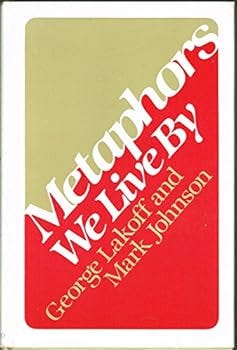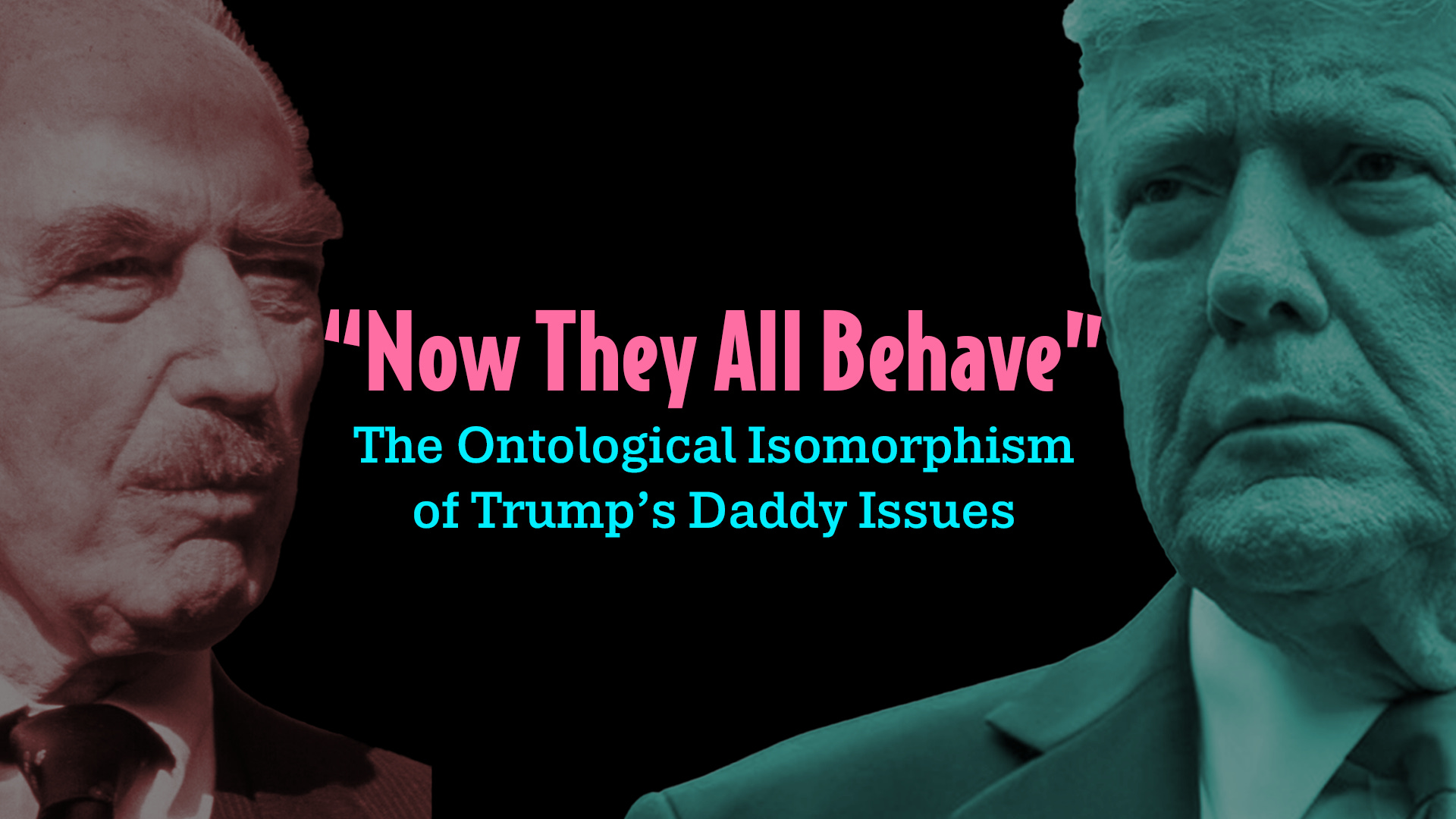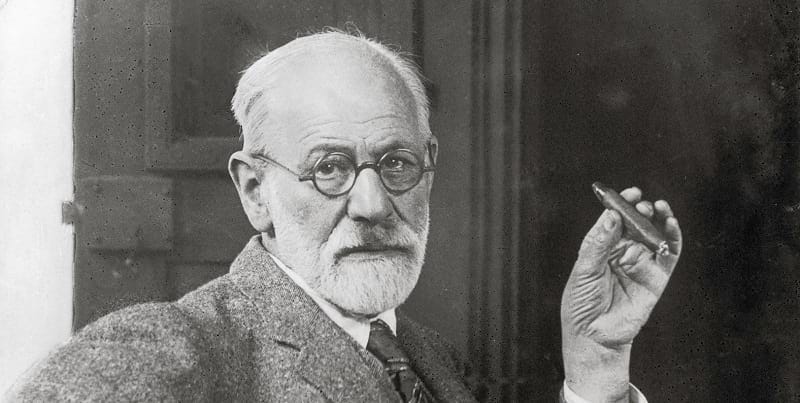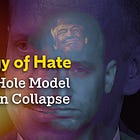“Now They All Behave”: The Ontological Isomorphism of Trump’s Daddy Issues
How the complexity of the mind can be seen through patterns—and why it matters.
My overall project is to understand and explain the psychological causes—and solutions—for the accelerating crisis in American and global politics.
How do individual minds become ensnared in groupthink?
How does a malignant collective form around the pathology of an individual?
The Vertical Ontology of Mind
The mind is one of the least—and most—understood parts of human existence. We all know what the mind is because we all have one, but on the other hand, any serious effort to understand it requires an interdisciplinary approach, from the molecular to the metaphysical.
Biochemistry—how molecules interact in the body and brain’s physical systems
Neuroscience—how the physical systems behave in form and function, e.g. through networks of neurons
Psychiatry—how the physical systems of the mind affect its external function, and how that function can be modified by medication
Psychology—how the external function of the mind can be described by underlying internal processes, and modified through conversation
Philosophy—how the internal processes of the mind can be categorized and explained, and how that is revealed in society
Metaphysics—how the individual and society can be explained by higher order systems, e.g. religion, ethics, aesthetics
Ontology is the study of being, the work of categorizing reality into its most essential components. The ontology of the mind, from biochemistry to metaphysics, is so complex that countless generations of mind-owners have been unable to completely describe it. However, whenever there are repeating fractal patterns along this ontological continuum which accurately describe and predict real behavior—an isomorphism—that is highly likely to be an important signal.
An isomorphism is a one-to-one correspondence between two mathematical or structural systems that demonstrates they have the same underlying structure.
So, an ontological isomorphism of the mind is a pattern played out on different scales of the mind’s existence. This is both diagnostic and predictive.
Below, I describe one such isomorphism—between cognitive linguistics and Freudian psychoanalysis—and how it is currently affecting the planet: Trump’s Daddy Issues.
Conceptual Metaphor Theory: Strict Father
Conceptual Metaphor Theory (CMT) emerged from cognitive linguistics, primarily from the work of George Lakoff and Mark Johnson in Metaphors We Live By (1980). CMT argues that thought itself is metaphorical: we understand abstract ideas by mapping them to instinctual functions, ie. physical sensations and familial dynamics. Furthermore, according to CMT, language has evolved based on these abstract mappings.


For example, emotions are described as motion, or pressure:
“Burst into tears”
“Exploded with anger”
“Pressure’s building”
“Let off steam”
“He’s weighed down by grief”
“I’m touched”
“Bottling it up”
There are numerous examples of this pattern throughout human language—of clusters of similar physical metaphors representing categories of abstract ideas. One of these clusters in particular is notable: politics as family.
“Founding fathers”
“Motherland / Fatherland”
“Uncle Sam”
“Nanny state”
“Disobedient citizens”
“Law and order as parental discipline”
Lakoff described politics as a metaphor for archetypal parents: Strict Father (conservative) and Nurturant Parent (progressive). The Strict Father’s world is dominated by outside threats, moral rigidity, and control through rewards and punishment.
CMT describes a source domain and a target domain. Here are some key mappings around the Strict Father metaphor:
Father → Leader/State (legitimate authority disciplines for the child’s own good)
Obedience → Morality (to disobey rightful authority is to be immoral)
Punishment → Love/Protection (pain now prevents worse pain later)
Wealth/Power → Virtue (success proves moral character)
Dependency → Vice (empathy is weakness; self-reliance is strength)
As an example of the Strict Father metaphor in action, Donald Trump has taken it to a disturbing extreme. Here is an interview he did before his Great Gatsby party at Mar-a-lago for the late great 60 Minutes, now the victim of a political takeover at CBS.
Here are ten extracted quotes illustrating the Strict Father metaphor: authority, obedience, protection, punishment—all in extreme, grandiose terms:
“We’re the head of the family again. China knows it, Russia knows it. When I’m there, they behave.”
“Do you know how many presidents have used the Insurrection Act? Almost 50% of ’em. … I could bring in the Army, the Marines, I could bring in whoever I want.”
“We’re not gonna allow countries from – what – you know, it’s countries from all over the world coming in … they come in from the Congo…”
“When I look at D.C. now … You can walk down the middle of the street. You can have your daughter who’s ten years old meet you at the park. She’s gonna be okay.”
“They respect us again. Every country calls, ‘Mr. President, please don’t do this,’ and I say, ‘then behave.’ Now they all behave.”
“You have to have a leader that people respect; otherwise the world falls apart.”
“We took out the killers. We took out the drug dealers. Nobody did what we did.”
“When people cheat us, we have to hit them hard, and then they stop cheating.”
“You have to be tough; if you’re weak, they walk all over you.”
“When I tell them what to do, they do it. It’s called respect.”
In CMT, this activates primal linguistic circuitry—hijacking the instinctual desire to preserve and protect family through metaphor. This is a powerful analytical tool by itself. A way to sharpen focus on a behavior pattern we can all recognize.
But what if we jump up a rung on the ontological ladder, from the core mechanics of metaphorical thought to Freudian psychoanalysis?
Freud: The Father Complex and Castration Anxiety
“He [man] makes the forces of nature not only into persons but into fathers. He gives them the features of the father, he makes them gods.”
Sigmund Freud, The Future of an Illusion (1927)
Siegmund Freud’s contributions to the field of psychology were enormous, including the founding of psychoanalysis—a way to evaluate, and treat, behavioral pathologies through dialogue. Among Freud’s more famous concepts is the Oedipus Complex, in which the son cannot kill the father, so he becomes him.
Donald Trump’s childhood and psychological foundation has been well described by Mary L Trump and others. Fred Trump was distant, authoritarian, and equated love with dominance and success. His household was a Darwinian competition for affection and avoidance of humiliation, which was frequently applied. This internalized a moral binary system where power equals love, and weakness equals contempt.
Donald was never able to integrate his father’s authority into his own ego, instead he built a grandiose self-ideal to cover over his early narcissistic injury, and to erase his father—by mimicking him. Donald’s own life of abusive behavior is an obsessive imitation of his own fear of shame and ridicule by his father. Freud called it the repetition compulsion.
Observationally, there are two modes with Trump: seeking adoration, and projecting strength. Trump’s entire oratorical style is oscillating back and forth between these two roles in his own historical psychodrama: abuser, and his needy victim.
But Freud also noted that sexual repression and fear of exposure creates a special motivation, and a mortal vulnerability. For Freud, all neuroses had a basis in the conflict between instinct (Eros) and repression (Superego). The threat of exposure revives an infantile dread, but it also fuels a compulsive, exhibitionist desire to both reenact sexual deviance—and project shame onto others.
Freud called this castration anxiety, the existential terror of being punished for sexual deviance. Donald Trump’s fear of Epstein is not a political calculation; it is avoiding personal annihilation.
Trump is, in effect, caught in his own childhood metaphor: a terrified boy locked in a room with a monster, and a monster in a room with a terrified boy.
When Lakoff and Freud Share a Diagnosis
Both Lakoff and Freud are describing the same behavior, through different metaphorical systems, one linguistic, one psychoanalytical: a projection of a sadistic relationship, long gone, but never forgotten. Donald Trump is playing both the Strict Father and the rejected, shameful boy, on loop—forevermore. This is what we’re watching every day.
Lakoff maps how the language of political obedience is converted to moral order through the activation of instinctual relationships. Freud shows how the unconscious mind maps paternal dominance into internal psychic order.
When both of these different systems converge in the supposed leader of the free world, it’s a strong signal that this is a meaningful dynamic, and a dangerous one. Trump is not just invoking the Strict Father, he’s embodying it. His rhetoric and own pathology are the same structure—they are ontologically isomorphic.
We are all victims of Trump’s metaphor.
Oedipus Populi—How the People Became the Son
How does a boy’s Oedipus complex become transferred to a population? How does this end up being a society-wide dynamic? Why has this internal metaphor metastasized to the whole world?



In Freud’s myth, the son kills the father to become him; in ours, the people sacrifice their freedom to preserve the father’s illusion. Here is how Freud described groups of people.
“A group is a number of individuals who have substituted one and the same object for their ego ideal and have consequently identified themselves with one another in their ego.”
—Sigmund Freud, Group Psychology and the Analysis of the Ego (1921)
Freud’s description of group dynamics as influenced by paternal authority is mirrored by Lakoff three-quarters of a century later.
“The Strict Father interpretation of evolution can then be turned metaphorically into Social Darwinism, the survival of the fittest in society; and then, via the metaphor of the Moral Order Is the Natural Order, the social survival of the fittest can be seen as moral.”
—George Lakoff, Moral Politics: How Liberals and Conservatives Think (1996)
This isomorphism of an individual’s personal disorder to societal dysfunction is one of the most important and potentially destructive phenomena we face as a species. Social Darwinism, the mistaken and genocidal belief that the rules of the jungle should apply to the rules of everyday life, is essentially the entire policy portfolio of the Trump regime.
Ontological Flexibility
The current geopolitical and informational environment is deeply challenging to interpret and keep track of for most people. As someone who has reported on it seven days/week for five years, I can attest to how hard it is to try to interpret through the normal channels. “Just the facts ma’am” is a world of journalism that never existed in the first place, but in this new hyper-metaphorical environment, with the corruption of our basic institutions all around us, the news doesn’t help us for the most part—it controls us.
That’s why my work is about understanding more than just the events that take place, because once something happens, it’s over. This is the chief advantage of our adversaries—they just keep doing things and we keep reacting.
In order to get to the bottom of the dysfunction, to diagnose and subvert the authoritarian, anti-human movement plaguing the world, we must have ontological flexibility. We must understand what’s going on at different levels of the same reality. That’s why the neurology of threat in the individual is just as important as the philosophical grounding of the political project of fascism. The isomorphism is signal.
That’s also why, for example, I wrote about the cosmology of hate. The kind of isomorphism we can see between the void of a deviant conscience and a singularity in space-time is a metaphor, and as we have seen those can be very powerful.
But the world around us is not a metaphor. The Oedipus that lives inside Trump and so many of his followers is an illusion born of an infantile fear. Understanding how those fears translate to votes—and violence—is the kind of complex problem that ontological isomorphism helps narrow down.
As the great Parliament/Funkadelic said:
“Free your mind, and your ass will follow.”
If you are able to help me continue my work, please consider upgrading to a paid subscription. It really means a lot. Thank you!
Here are a few benefits to upgrading:
Live Zoom call each Sunday
Ability to comment and access all content
Wonderful, supportive community
Helping independent journalism fill in the gaps for our failing media
Thank you for reading and sharing my work. Grateful for your support.
If you’d like to help with my legal fees: DefendSpeechNow.org.
My podcast is @radicalizedpod & YouTube — Livestream is Fridays at 1PM PT.
Bluesky 🦋: jim-stewartson
Threads: jimstewartson





This is a psychoanalysis presented as a national security briefing, and it's painfully on point. Trump’s pathology is policy. We’ve spent a decade treating his malignant narcissism like a personality quirk instead of what it is: a contagion of obedience and projection that rewires entire populations.
Stewartson’s mapping of Lakoff’s “Strict Father” metaphor to Freud’s father complex is genius and horrifying in equal measure. Trump doesn’t just invoke authoritarian patriarchy; he is its living recursion; the boy who never escaped his father’s contempt now forcing a nation to call him “Daddy.” Every cheer at a rally, every promise of punishment, is Freud’s repetition compulsion scaled up to the size of an empire.
The “ontological isomorphism” here isn’t theoretical; it’s operational. When a populace internalizes a father’s abuse as love, democracy doesn’t die in darkness; it dies calling him “sir.”
I can’t wait to try & understand all this bc it’s so important. Thank you thank you thank you for staying on it!